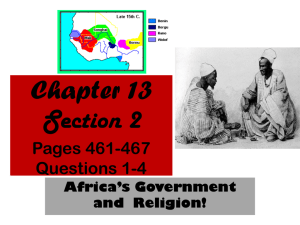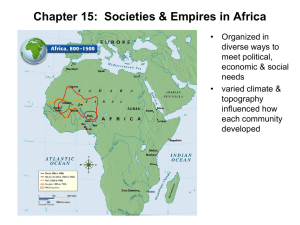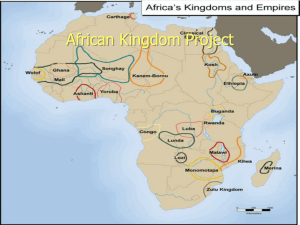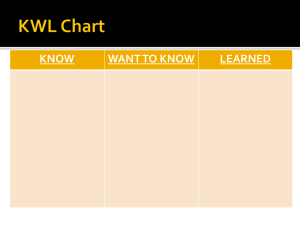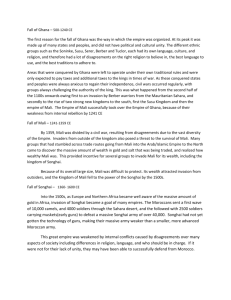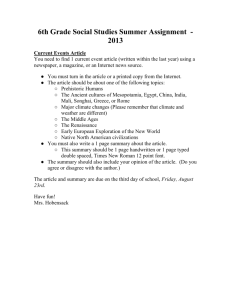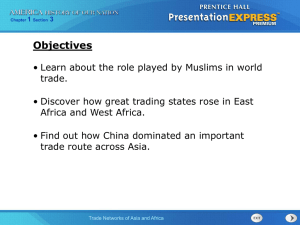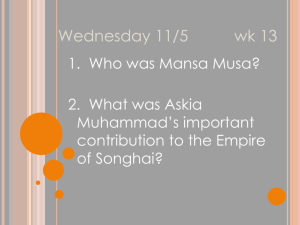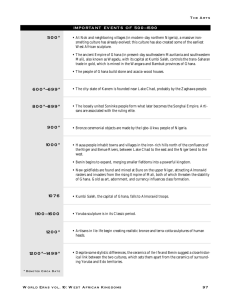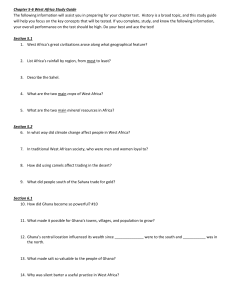Chapter 15: Societies and Empires in Africa
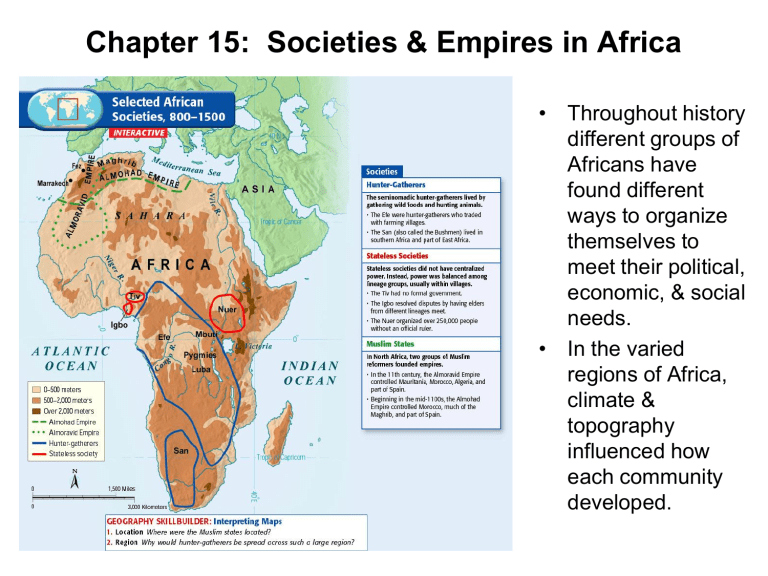
Chapter 15: Societies & Empires in Africa
• 800-1500
• Throughout history different groups of
Africans have found different ways to organize themselves to meet their political, economic, & social needs.
• In the varied regions of Africa, climate & topography influenced how each community developed.
How did Geography & Climate influence development in Africa?
• Great variety
– Climate
– Topography
– Landforms
North & Central African Societies:
Hunter-Gatherer
• formed close-knit family groups
• Oldest in world
• Still around
• Provide clues about ancient times
Hunter-Gatherer Societies
• Semi-nomadic
• Few possessions, distinctive hunting techniques
“Stateless” Societies
• Power not centralized
• Based on lineage groups not individual ruler
– Family groups based on a common ancestor
– Living members
– Past generations
– Future generations
– Strong loyalty
• balance authority among lineages of equal power
• may be
– patri-lineal
– matri-lineal
• Men usually hold positions of authority
Muslim States
• Islam spread across N. Africa-
• Rulers converted
• Government based on Islamic
Law (Sharia)
• Muslim rulers relied on religious scholars as government advisors
Berbers
• Desert, mountain dwellers
• Indigenous to N. Africa
• Accepted Islam
• Maintained Berber Identity
• Almoravids & Almohads found empires that united N. Africa
(Maghrib)
Impact of Berber Rule
• Spread N.
African culture
• Stability &order
• Unity through
Islamic teaching
• North/South
Trade flourished
West African Civilizations
• While Berbers built empires in N. Africa, three powerful empire flourished in
West Africa in the
Sahel-the savanna region just south of the Sahara
• Grew strong by controlling trade
Empire of Ghana
• Around 200 AD, trade across Sahara was infrequent
• Berbers began to use camels
• Travel great distance without water
• Taxed trade-grew wealthy
Gold-Salt Trade
• Arab & Berber traders crossed desert loaded w/salt, cloth, weapons, manufactured goods
• African traders brought gold north
• Merchants met in trade cities, exchanged goods, officials collected tax
& ensured fair weights and provided protection from bandits
Land of Gold
• By 800, Ghana was an empire
• King controlled trade, large army, demanded taxes and gifts from chiefs of surrounding lands.
• King controlled supply of gold, kept price high
• King was religious leader, judge, military commander
• Head of government bureaucracy
Islamic Influences
• Islam spread through trade
• Ghana’s rulers/elites converted to Islam
• Common people kept traditional beliefs/practices
• Islam spread literacy
• Ghana lost power when
Almoravids disrupted gold-salt trade
Empire of Mali
• By 1235 the kingdom of Mali had emerged.
• Its founders were Mandespeaking people , who lived south of Ghana.
• Mali’s wealth was also built on gold .
Sundiata Conquers an Empire
• A powerful king named
Sundiata ruled Mali from around 1230-1255 AD. He became known as a mansa, or emperor.
• He led the people in conquering and expanding his kingdom to be as great as
Ghana had been.
Mansa Musa Expands
Mali
(1312-1337)
• Greatest king of Mali
• developed gold/salt trade-kingdom became very powerful
& rich
• Made hajj to Meccaupon return built many mosques in
Timbuktu
• Attracted Muslim judges, doctors, religious leaders scholars
Ibn Battuta: 1352
• Muslim legal scholar
• Traveled throughout
Muslim world -27 years
• Wrote a journal
• Praised the people of
Mali for their study of
Qur’an
• Criticized lack of strict practice (women did not veil)
• Within 50 years, gold trade shifted to new fields in East
• Mali weakened
Empire of Songhai
• As Mali declined, Songhai east built an army & extended territory-gained control of trade routes. Gao was the capital.
Songhai’s Powerful Leaders
• Sunni Ali
– Built a professional army
• Askia Muhammad
– Set up good government
Other Peoples of West Africa: Hausa
• Hausa City-States
Other Peoples of West Africa: Yoruba
Other Peoples of West Africa: Benin
Eastern City-States & Southern Empires
• In the 3 rd century, Aksum traded extensively. From
Red Sea it traded with
Arabia, Persia, India &
Rome
• Muslims cut them off from their port so they moved their capital south
• Other cities on East coast were thriving from Indian
Ocean trade
East Coast Trade
Cities
Kilwa
Portuguese Conquest
Islamic Influences
Enslavement of Africans
Southern Africa & Great Zimbabwe
Great Zimbabwe
Mutapa Empire
